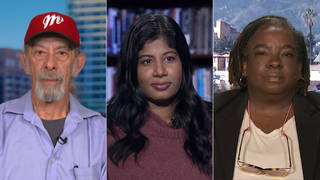
By Amy Goodman with Denis Moynihan
Unions are under attack in the United States—not only from people like Gov. Scott Walker of Wisconsin, but now, with the teachers strike in Chicago, from the very core of President Barack Obama’s inner circle, his former chief of staff and current mayor of that city, Rahm Emanuel. Twenty-five thousand teachers and support staff are on strike there, shutting down the public school system in the nation’s third-largest school district. This fight now raging in Chicago, Obama’s hometown, has its roots in this historic stronghold of organized labor, and in the movement started one year ago this week, Occupy Wall Street. The conflict presents a difficult moment for Obama, who will need union support to prevail in his race with Mitt Romney, but who is inextricably linked, politically, to his brash, expletive-spewing former aide, Mayor Rahm-ney Emanuel.
At the heart of the conflict is how schools will be run in Chicago: locally, from the grass roots, with teacher and parent control, or top-down, by a school board appointed by Emanuel. Karen Lewis, president of the Chicago Teachers Union, worked as a board-certified chemistry teacher at King College Prep High School in Chicago. She understands how the system works. Months before the strike, I asked her about the situation in Chicago. The newly elected Emanuel had an appointed board comprised mostly of corporate executives, the Academy for Urban School Leadership. Lewis told me, “One of the biggest problems is that when you have a CEO in charge of a school system, as opposed to a superintendent, a real educator, what ends up happening is that they literally have no clue as to how to run the schools.” The AUSL not only relies on business executives with no education experience to run schools, but also brings in recent college graduates to teach. These recruits cost very little to pay, but arrive with little or no teaching experience.
Pauline Lipman is a professor of education and policy studies at the University of Illinois-Chicago. She explained, “Chicago was the birthplace of this neoliberal corporate reform agenda of high-stakes testing, paying teachers based on test scores, disinvesting in neighborhood schools and then closing them and turning them over to charter schools.”
Lipman credits Arne Duncan with driving this corporatization of Chicago’s public schools. Duncan, President Obama’s secretary of education, was the chief executive officer of the Chicago Public Schools, where he led the institution of charter schools, 90 percent of which are nonunion. “Arne Duncan pushed through this agenda of closing neighborhood schools, turning them over to private operators or expanding charter schools and having charter schools come in … and increasingly putting more pressure on teachers to respond to high-stakes tests. That agenda has been really devastating in Chicago.”
Chicago is also the epicenter of the community pushback against the Duncan/Obama/Emanuel attack on public schools and the teachers union. Lewis comes out of the Caucus of Rank-and-File Educators, CORE, which took over leadership of the union with a commitment to transparent school administration. Opposition to Emanuel’s dictates has provoked the union into this historic strike. Phil Cantor, a strike captain for Teachers for Social Justice, explained: “We’re not allowed legally to strike over anything but compensation. But teachers are not most interested in compensation; we’re most interested in being able to do our jobs for the students we serve.”
Thanks to the grass-roots organizing that preceded the strike (in the same Chicago streets where Obama was once a community organizer), the striking teachers enjoy extensive parent and student support. One parent, Rhoda Rae Gutierrez, has two children in elementary school in Chicago. She is a member of the group Parents 4 Teachers and is marching with the teachers. She told me, “When we fight for the rights of teachers for a fair contract, fair compensation, lower class size, well-resourced schools, having psychologists, enough social workers, enough support staff, enough aides in the classroom, nurses … when teachers have these resources in their schools, we know that our children can do incredible things.”
This struggle reflects the essence of Occupy Wall Street—community members across class, race and other traditional divides uniting in disciplined opposition to corporate power. Author and journalist Chris Hedges, who has observed the Occupy movement closely, put the strike into context:
“The teachers’ strike in Chicago is arguably one of the most important labor actions in probably decades. If it does not prevail, you can be certain that the template for the attack on the union will be carried out across the country against other teachers unions and against the last redoubt of union activity, which is in the public sector, of course—firemen and police.”
For people who are wondering where Occupy is today, just look at the streets of Chicago.
Amy Goodman is the host of “Democracy Now!,” a daily international TV/radio news hour airing on more than 1,100 stations in the United States and around the world. She is the author of “Breaking the Sound Barrier,” recently released in paperback and now a New York Times best-seller.











Media Options